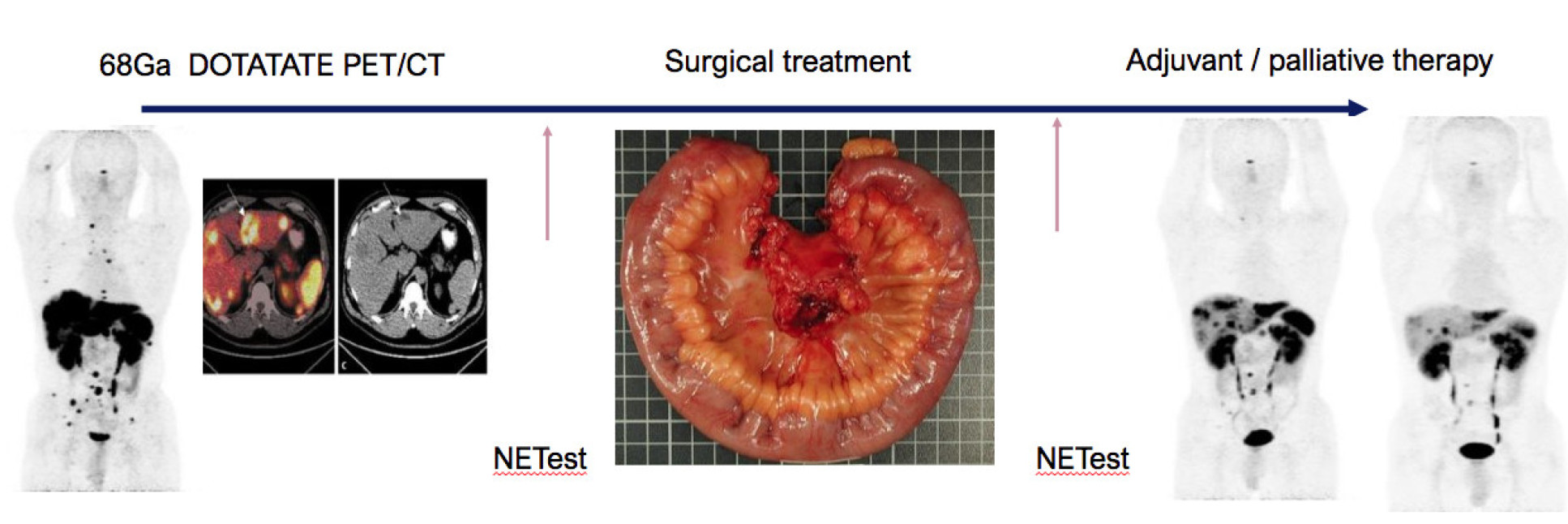
What we do
At Imperial College Healthcare NHS Trust and Imperial College London we have established a European Neuroendocrine Tumour Society (ENETS) Centre of Excellence (CoE) for treatment of neuroendocrine tumours. The aim of ENETS CoE is to improve clinical management of NET patients, develop clinical trials, provide education, support research, and enhance cooperation in the NET community.
We are intensively working towards personalised treatment of patients with neuroendocrine tumours including identification of novel multidimensional biomarkers, clinical implementation of modern molecular imaging techniques, introduction of targeted treatment options, and multimodal treatment approaches.
Why it is important
Neuroendocrine tumours represent a diverse group of neoplasia that generally arise in the gastro-entero-pancreatic system and lung. Although originally considered rare, improvement in diagnostic strategies has resulted in an apparent increase in incidence. Since their prevalence is high (>35/100,000); they therefore constitute a substantial health economic burden. Outdated perspectives of indolence have been superseded by appreciation for their myriad clinical challenges, such as the high rates of regional and distant metastases at initial diagnosis, lack of clarity on optimal treatment strategies/sequencing, and incompletely elucidated genetic/other pathophysiological drivers.
How it can benefit patients
Neuroendocrine tumours frequently present with distant metastases at the initial diagnosis. Less than 20% of patients with distantly metastatic NET are candidates for surgery with curative intent. Multimodal treatment approach combining surgery with non-surgical systemic or liver-directed treatment modalities have the potential to prolong survival. The clinical utility of standard tumour markers for NET is burdened by limited accuracy and there is an urgent unmet need for novel non-invasive biomarkers for early identification, treatment monitoring, precision diagnostics and phenotyping of NET for the stratification of therapy.
Summary of current research
Our current research in neuroendocrine tumours is focusing on novel “omics”-based biomarkers, early identification of micro-residual disease following surgery, and multimodal treatment of advanced tumours and their liver metastases.
Additional information
- Dr Heinz-Horst Deichmann Foundation
- Commission of the European Communities/FP7
- TransNETS of UKI NETS
- Imperial NIHR Biomedical Research Centre
Related Centres
Industry
- Professor Irvin Modlin, University Yale, WREN Laboratories, USA
- PD Bruno Steinkrauss, Hummingbird Laboratories, Germany
- Professor Jakob Izbicki, University Hospital Hamburg, Germany
- Professor Massimo Falconi, University Vita e Salute, Milano, Italy
- Professor Rajesh Thakker, University Oxford, UK
- Assistant Professor Artur Braat, University Utrecht, The Netherlands
- Comprehensive profiling of the microbiome and metabolome in small intestinal neuroendocrine tumours.
- Circulating MicroRNAs in Small Bowel Neuroendocrine Tumors – a potential tool for diagnosis and assessment of effectiveness of surgical resection.
- Utility of blood-based multianalyte gene transcript (mRNA) signature (NETest) for identification of residual disease following surgery.
- A prospective evaluation of the management of asymptomatic sporadic non-functioning pancreatic neuroendocrine tumours ≤2 cm.
- A precision oncology approach to the pharmacological targeting of mechanistic dependencies in neuroendocrine tumors. Alvarez MJ, et al. Nat Genet. 2018 Jul;50(7):979-989. doi: 10.1038/s41588-018-0138-4. Epub 2018 Jun 18.PMID: 29915428
- A meta-analysis of the accuracy of a neuroendocrine tumor mRNA genomic biomarker (NETest) in blood. Öberg K, et al. Ann Oncol. 2020 Feb;31(2):202-212. doi: 10.1016/j.annonc.2019.11.003. Epub 2019 Dec 20.PMID: 31959337
- Circulating MicroRNAs in Small-bowel Neuroendocrine Tumors: A Potential Tool for Diagnosis and Assessment of Effectiveness of Surgical Resection. Malczewska A, et al. Ann Surg. 2019 Aug 1. doi: 10.1097/SLA.0000000000003502. Online ahead of print.PMID: 31373926
- Radioembolisation with 90Y microspheres for neuroendocrine liver metastases: an institutional case series, systematic review and meta-analysis. Frilling A, et al. HPB (Oxford). 2019 Jul;21(7):773-783. doi: 10.1016/j.hpb.2018.12.014. Epub 2019 Feb 5.PMID: 30733049
- ALPPS in neuroendocrine liver metastases not amenable for conventional resection - lessons learned from an interim analysis of the International ALPPS Registry. Linecker M, et al. HPB (Oxford). 2020 Apr;22(4):537-544. doi: 10.1016/j.hpb.2019.08.011. Epub 2019 Sep 17.PMID: 31540885
- Blood measurement of neuroendocrine gene transcripts defines the effectiveness of operative resection and ablation strategies. Modlin IM, et al. Surgery. 2016 Jan;159(1):336-47. doi: 10.1016/j.surg.2015.06.056. Epub 2015 Oct 9.PMID: 26456125
- Recommendations for management of patients with neuroendocrine liver metastases. Frilling A, et al. Lancet Oncol. 2014 Jan;15(1):e8-21. doi: 10.1016/S1470-2045(13)70362-0.PMID: 24384494
- Neuroendocrine Neoplasms of the Small Bowel and Pancreas. Clift AK, et al. Neuroendocrinology. 2020;110(6):444-476. doi: 10.1159/000503721. Epub 2019 Sep 27.PMID: 31557758
- Neuroendocrine Neoplasms: Identification of Novel Metabolic Circuits of Potential Diagnostic Utility. Jiménez B, et al. Cancers (Basel). 2021 Jan 20;13(3):374. doi: 10.3390/cancers13030374.Cancers (Basel). 2021. PMID: 33498434
- Surgical management of patients with neuroendocrine neoplasms of the appendix: appendectomy or more. Pawa N, et al. Neuroendocrinology. 2018;106(3):242-251. doi: 10.1159/000478742. Epub 2017 Jun 23.PMID: 28641291
Our researchers
Professor Andrea Frilling
/prod01/channel_3/media/migration/faculty-of-medicine/portrait-8_1612442717108_x4.jpg)
Professor Andrea Frilling
Chair in Endocrine Surgery
Dr Ashley K. Clift
/prod01/channel_3/media/migration/faculty-of-medicine/ashley-clift-img-20190812-150153-1_1612891748400_x4.jpg)
Dr Ashley K. Clift
Honorary Clinical Research Fellow
Dr Adam Frampton
/prod01/channel_3/media/migration/faculty-of-medicine/portrait-mr-adam-frampton-02-10-2018-5-tojpeg-1539724576882-x1_1612442935683_x4.jpg)
Dr Adam Frampton
Honorary Clinical Lecturer
Mr Mikael Sodergren
/prod01/channel_3/media/migration/faculty-of-medicine/sapphire-bw-077-jpg-tojpeg-1563458519570-x1_1612443032444_x4.jpg)
Mr Mikael Sodergren
Clinical Senior Lecturer
Mr Duncan Spalding
/prod01/channel_3/media/migration/faculty-of-medicine/holding-png-tojpeg-1564655919889-x2_1612443152407_x4.jpg)
Mr Duncan Spalding
Clinical Senior Lecturer